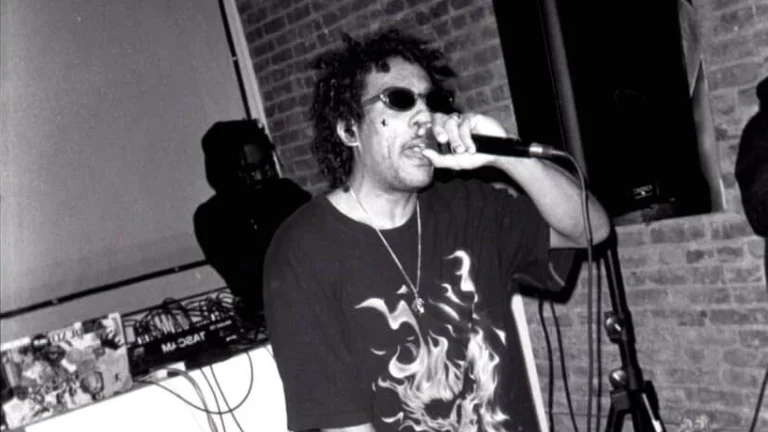The first and only time I met Buff Ginger founder Ry Minter was at Brooklyn Made, the last time country-gaze outfit Wednesday passed through Ridgewood. Scores of us had gone outside between sets to gawk at Scarlett Johansson and Colin Jost, who had just emerged from Union Pizza Works across the street and were being escorted to a black SUV. They moved with a sort of contrived caution and precision, wary of the mysterious crowd of blank-faced flannel and Demonia wearers who had migrated from their respective anthills to see them off. Both sides stared out at each other for a moment as if two species were making first contact, each mystified by the ritualistic elements of the newcomers’ habits—and unconscious of their own.
I think it was cold. I spotted some acquaintances to my left, between which Ry—who is neither buff nor ginger—nestled. I can’t remember which one of us was eating a churro. If it was me, I spoke with my mouth full, keeping one hand over my lips to try to keep my spit within a one-foot radius. If it was her, crumbs and flecks of sugar hung from their mustache. Was there a substantial height difference? If so, they would have tilted their head slightly upwards as I asked about their interests, their music, their upcoming shows. They went to Parsons for illustration, of that I’m fairly certain, suggested I reach out if I ever needed concert posters, and typed their Instagram handle into my search bar. Afterward, we heard the tuning of a slide guitar and herded ourselves past Brooklyn Made’s airstream-turned-ticket booth into the belly of the place.
Alright, I got it. That would have been September 29th, 2022, meaning I’ve followed Buff Ginger for something like a year and a half, treated to pictures of pedalboards, of set lists and settings, and tags of select local heads like a who’s-who of the scene throughout. The band represents a fascinating link in the chain of the Bushwick shoegaze community—a community quite wary of the term ‘shoegaze’ in and of itself, despite close parallels to progenitor acts like Lush and My Bloody Valentine. By and large, the scene utilizes a saturated, lo-fi, and often childlike form of digital art as the rabid aesthetic backdrop for a lush, heavily distorted sound. Concerts often feature trippy, intricately programmed visuals seemingly distilled from old VHS tapes—visual feasts to accompany massive soundscapes. Posts promoting the latest, loudest releases are rife with images of distorted clipart creatures. More often than not, the songs themselves voice less rage rather than something like an overwhelming sense of disappointment—in career, romance, self. New Jokes, released this past December, is a confident step forward within that same vein. Here, Buff Ginger pushes eagerly, and rather successfully, on these aesthetic precedents of their community, adding legitimacy to the BushGaze project as a whole and proving their own capacity for experimentation.
In New Jokes, push and pull is the name of the game. The first track on the EP, “Setup,” winds itself up like an overture, swells, and soars before spilling over into the next. “Giant Steps 2,” a faster and melodically denser tune built on doubled guitars, octave overdubs, and an underlying wail of distortion, brings us to still-higher levels of energy and velocity. Then comes “All the Little Birds,” which pulls you in with a measured introspection as if to offer a catch to the prior five or so minutes of unfettered fun. There’s a story being told here, of that I’m sure, but I can’t quite make out the words. If you risk leaning in to listen, know your ears will blow out at about the 1:12 mark, where the instrumentation bottlenecks into one impressive, monophonic riff. Minter throws us a bone as if to smooth out any discontents, a strand of seven words—“Ain’t that just the way it goes?”—to help us settle more comfortably into this frothing pool of discontents.
New Jokes is rife with moments that catch you off guard, splashes of color engineered to keep listeners from settling back into a fuzzy daze, like a baby questioningly poking one’s cheek as they fall asleep on the subway, or how my cat bats at my face at two in the morning to make sure I haven’t yet died. On “Punchline,” a classic, chorus-laden climax with a crisp single coil sound, a ghostly soprano vocal cuts through the mix, conspiring with the church organ-esque resolutions of the main melodic line to produce near heavenly results. Sort of similarly, a Roger Waters-esque dolphin scream on “Giant Steps 2” may either light up one’s pleasure centers or test one’s fight or flight response. A series of buffers and track skips across the song helps to maintain tension with a frenzied, glitchy, new-age flair. Here, the band trades in standard, well-timed pauses for something equally engaging but doubly stimulating. Lead single “Bong World” is a bit more stable—yes, a bit less off the wall—but shines through its refrain: “…hit me as hard as you can, as hard as you can, as hard as you can.” It speaks with an effective simplicity to the underlying emotionality of the entire piece, a complicated mix of euphoria, disillusionment, and resignation.
The EP, co-produced by Minter and Ethan Williams of Punchlove, is stuffed with qualities to be envious of. Ample space to breathe is given to occasional strands of free-standing notes from the lead guitar, leaving listeners with something to hum and leaving me with a greater appreciation for the kind of measured orchestration that forms the backbone of these songs. Drummer Ian McPherson’s performance is solid, with heavy, acrobatic hits that hold one’s attention. Minter’s voice is well-balanced against all of this, an engineering feat in and of itself for a bass/baritone whose vocals might otherwise stand to drown in a sea of full-spectrum distortion. And sure, the bulk of the lyrics are somewhat illegible––but ain’t that just the way it goes?





